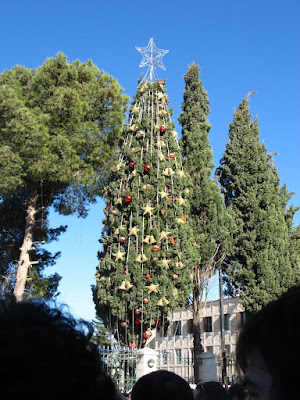In Israel, we stayed with two of Dave's father's cousins, Adela and Yoram (and his wife Yordana), as well as his friend from university, Steph. All of them took
amazing care of us.
 |
| sweet adela |
After fending for ourselves for a year, it was
so awesome to be
totally spoiled. They patiently listened to our travel stories, fed us
delicious Israeli and Jewish foods, arranged our transportation, let us into their beautiful homes, and gave us a little glimpse into life in Israel.
 |
| caeseria with yoram |
It was more than just a visit--they treated me like a friend and a family member. If Adela, Yoram, Yordana, or Steph ever see this...
!תודה, תודה, תודה
 |
| dinner with steph (not pictured: enzo) |
Other thoughts on Israel...
To be brutally honest, at first I didn't have much interest in visiting Israel. Maybe because I didn't have many expectations, a crazy thing happened--I found a lot of meaning in my trip there.
It's a place I had to see for myself to begin to understand.
 |
| israeli flag at masada |
Yeah, the traveling Israelis I saw everywhere in South Asia are generally rude, loud, and willing to argue over the equivalent of five cents. But then I met two sweet, dedicated, 17-year old young women who are about to begin their military service. I thought about what it would be like to dedicate my freshman, sophomore, and junior years of university to the defense of my country, how that would change me, and it became difficult to judge those young Israelis getting drunk in Pokhara.
Yeah, Israel is doing some nasty stuff to Arabs living in occupied territories. But then I talked to multiple Israelis who believes that the two-state solution is the only solution (
about 70% do)--anything else, everything else, would be perpetual war. I thought about how the outlandish opinions of extremists and fundamentalists can alter the world's opinion of a nation. Hell, I'm American, I know this too well.
 |
| praying at the western wall |
On a personal level... my dude pal, Davo, is Jewish. We agreed early that, should we procreate someday, he would raise them with Jewish traditions. (For the record, I would and should teach them about my family's Christian and Catholic religious heritage.) Since Dave is not particularly observant, and I've had the most contact with Judiasm through him, I thought that raising Jewish kids would be as simple as lighting a few candles on special days. I'm vegetarian--our kitchen would already be kosher!
After spending a few weeks in a Jewish State, where the buses don't run on the Sabbath, I see it's not that simple. One of my former colleagues who now resides in Jerusalem, Oren, invited us to a Shabbat dinner on Christmas Eve. When Dave celebrates Shabbat, he recites a few prayers before the meal, we eat bread and drink wine, and that's about it. Oren is more observant, and so we went through everything: the prayers before, the bread and wine, the ritual washing of hands, and many beautiful prayers sung in Hebrew after the meal. An entire Shabbat world existed, and I didn't know about it!
The more I learn, the more I realize I don't know. This is true of everything! Languages, environmental issues, the economy, and yes, religion. Dave goes through the routine of being Jewish in America, but when I ask
why he does certain rituals, rarely does he know. In 2011, we've decided to read the Bible (Old Testament) together. And I'd like to attend adult education classes at a synagogue. Even though I'll never convert, I've realized that there's more to being Jewish than matzo ball soup and bagels, and I want to know more.
Thanks, Israel, for inspiring more curiosity in my life!















-1.JPG)
































